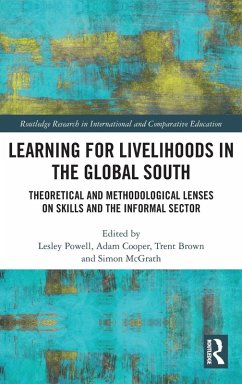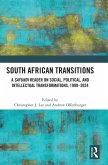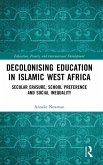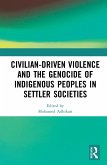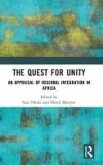Learning for Livelihoods in the Global South
Theoretical and Methodological Lenses on Skills and the Informal Sector
Herausgeber: Powell, Lesley; Mcgrath, Simon; Brown, Trent; Cooper, Adam
Learning for Livelihoods in the Global South
Theoretical and Methodological Lenses on Skills and the Informal Sector
Herausgeber: Powell, Lesley; Mcgrath, Simon; Brown, Trent; Cooper, Adam
- Gebundenes Buch
- Merkliste
- Auf die Merkliste
- Bewerten Bewerten
- Teilen
- Produkt teilen
- Produkterinnerung
- Produkterinnerung
This edited volume explores how youth and informal sector workers in the global south are pioneering learning and livelihoods that exist at the intersections of, and beyond, the boundaries of the state, market, and other formal institutions.
Andere Kunden interessierten sich auch für
![South African Transitions South African Transitions]() South African Transitions197,99 €
South African Transitions197,99 €![Decolonising Education in Islamic West Africa Decolonising Education in Islamic West Africa]() Anneke NewmanDecolonising Education in Islamic West Africa197,99 €
Anneke NewmanDecolonising Education in Islamic West Africa197,99 €![Technology and the Future of Work Technology and the Future of Work]() Balwant Singh MehtaTechnology and the Future of Work197,99 €
Balwant Singh MehtaTechnology and the Future of Work197,99 €![The Languages of Ghana The Languages of Ghana]() The Languages of Ghana154,99 €
The Languages of Ghana154,99 €![Civilian-Driven Violence and the Genocide of Indigenous Peoples in Settler Societies Civilian-Driven Violence and the Genocide of Indigenous Peoples in Settler Societies]() Civilian-Driven Violence and the Genocide of Indigenous Peoples in Settler Societies174,99 €
Civilian-Driven Violence and the Genocide of Indigenous Peoples in Settler Societies174,99 €![The Swahili Coast The Swahili Coast]() Christine NichollsThe Swahili Coast165,99 €
Christine NichollsThe Swahili Coast165,99 €![The Quest for Unity The Quest for Unity]() The Quest for Unity196,99 €
The Quest for Unity196,99 €-
-
-
This edited volume explores how youth and informal sector workers in the global south are pioneering learning and livelihoods that exist at the intersections of, and beyond, the boundaries of the state, market, and other formal institutions.
Hinweis: Dieser Artikel kann nur an eine deutsche Lieferadresse ausgeliefert werden.
Hinweis: Dieser Artikel kann nur an eine deutsche Lieferadresse ausgeliefert werden.
Produktdetails
- Produktdetails
- Verlag: Taylor & Francis
- Seitenzahl: 280
- Erscheinungstermin: 23. Dezember 2024
- Englisch
- Abmessung: 234mm x 156mm x 18mm
- Gewicht: 599g
- ISBN-13: 9781032626475
- ISBN-10: 103262647X
- Artikelnr.: 71570166
- Herstellerkennzeichnung
- Libri GmbH
- Europaallee 1
- 36244 Bad Hersfeld
- gpsr@libri.de
- Verlag: Taylor & Francis
- Seitenzahl: 280
- Erscheinungstermin: 23. Dezember 2024
- Englisch
- Abmessung: 234mm x 156mm x 18mm
- Gewicht: 599g
- ISBN-13: 9781032626475
- ISBN-10: 103262647X
- Artikelnr.: 71570166
- Herstellerkennzeichnung
- Libri GmbH
- Europaallee 1
- 36244 Bad Hersfeld
- gpsr@libri.de
Lesley Powell is Associate Professor in the School of Education at the University of Cape Town, South Africa. Adam Cooper is chief research specialist in the Equitable Education and Economies Research Division, Human Sciences Research Council of South Africa. Trent Brown is Associate Professor at Tokyo College at the University of Tokyo, Japan. Simon McGrath holds the established chair in Education at the University of Glasgow, UK.
Foreword
1. Skills, the informal sector and global south youth: theory and methods
to break the silence
PART 1. THEORISING: RETHINKING THE PURPOSE OF EDUCATION AND TRAINING
2. A relational capabilitarian approach for wellbeing livelihoods:
Reframing and making alternative education, skills and work for young
people
3. Subsumption, Alienation, and Questions of Meaning in Informal Sector
Skills Training
4. Supporting youth livelihoods in an informal "sub-field" in the global
south
PART 2. CONCEPTUALISING: CONCEPTUAL TOOLS FOR UNDERSTANDING INFORMAL SECTOR
SKILL ACQUISITION IN PRACTICE
5. Shifting informal geographies and the hustle for a better future
6. A typology of informal sector workers - heterogeneity and the complexity
of skills development responses
7. The potential role of ICT in facilitating learning for livelihoods among
informal apprentices in the automotive trade in Ghana
8. Highly educated migrants in platform-mediated food delivery work in the
Netherlands: The absent presence of skills and its social effects
PART 3. CRITIQUING: UNDERSTANDING CONSTRAINTS AND WEAKNESSES IN DOMINANT
APPROACHES
9. Exploring 'valuable' knowledge, skills and attitudes: Perceptions of
young people in an informal settlement in Pietermaritzburg
10. Critiquing the concept of 'self-reliance' in informal sector training:
A case study of Afghan refugee women in India
11. Gendering decent work: Rethinking the connections between informality,
TVET and gender through the 'Decent Work' agenda in Sierra Leone and
Cameroon
PART 4. ADVOCATING: TOWARDS REFORM OF POLICY AND PRACTICE
12. Financing Skills and Lifelong Learning in the Informal Sector
13. Exploring the intersectionality of green skills, innovation and
livelihoods in the informal economy in Harare, Zimbabwe
14. Recognising Colombian waste pickers as public service providers and
producers of knowledge
PART 5. CONCLUDING: MOVING FORWARD
15. Skill and livelihoods: some concluding ideas
1. Skills, the informal sector and global south youth: theory and methods
to break the silence
PART 1. THEORISING: RETHINKING THE PURPOSE OF EDUCATION AND TRAINING
2. A relational capabilitarian approach for wellbeing livelihoods:
Reframing and making alternative education, skills and work for young
people
3. Subsumption, Alienation, and Questions of Meaning in Informal Sector
Skills Training
4. Supporting youth livelihoods in an informal "sub-field" in the global
south
PART 2. CONCEPTUALISING: CONCEPTUAL TOOLS FOR UNDERSTANDING INFORMAL SECTOR
SKILL ACQUISITION IN PRACTICE
5. Shifting informal geographies and the hustle for a better future
6. A typology of informal sector workers - heterogeneity and the complexity
of skills development responses
7. The potential role of ICT in facilitating learning for livelihoods among
informal apprentices in the automotive trade in Ghana
8. Highly educated migrants in platform-mediated food delivery work in the
Netherlands: The absent presence of skills and its social effects
PART 3. CRITIQUING: UNDERSTANDING CONSTRAINTS AND WEAKNESSES IN DOMINANT
APPROACHES
9. Exploring 'valuable' knowledge, skills and attitudes: Perceptions of
young people in an informal settlement in Pietermaritzburg
10. Critiquing the concept of 'self-reliance' in informal sector training:
A case study of Afghan refugee women in India
11. Gendering decent work: Rethinking the connections between informality,
TVET and gender through the 'Decent Work' agenda in Sierra Leone and
Cameroon
PART 4. ADVOCATING: TOWARDS REFORM OF POLICY AND PRACTICE
12. Financing Skills and Lifelong Learning in the Informal Sector
13. Exploring the intersectionality of green skills, innovation and
livelihoods in the informal economy in Harare, Zimbabwe
14. Recognising Colombian waste pickers as public service providers and
producers of knowledge
PART 5. CONCLUDING: MOVING FORWARD
15. Skill and livelihoods: some concluding ideas
Foreword
1. Skills, the informal sector and global south youth: theory and methods
to break the silence
PART 1. THEORISING: RETHINKING THE PURPOSE OF EDUCATION AND TRAINING
2. A relational capabilitarian approach for wellbeing livelihoods:
Reframing and making alternative education, skills and work for young
people
3. Subsumption, Alienation, and Questions of Meaning in Informal Sector
Skills Training
4. Supporting youth livelihoods in an informal "sub-field" in the global
south
PART 2. CONCEPTUALISING: CONCEPTUAL TOOLS FOR UNDERSTANDING INFORMAL SECTOR
SKILL ACQUISITION IN PRACTICE
5. Shifting informal geographies and the hustle for a better future
6. A typology of informal sector workers - heterogeneity and the complexity
of skills development responses
7. The potential role of ICT in facilitating learning for livelihoods among
informal apprentices in the automotive trade in Ghana
8. Highly educated migrants in platform-mediated food delivery work in the
Netherlands: The absent presence of skills and its social effects
PART 3. CRITIQUING: UNDERSTANDING CONSTRAINTS AND WEAKNESSES IN DOMINANT
APPROACHES
9. Exploring 'valuable' knowledge, skills and attitudes: Perceptions of
young people in an informal settlement in Pietermaritzburg
10. Critiquing the concept of 'self-reliance' in informal sector training:
A case study of Afghan refugee women in India
11. Gendering decent work: Rethinking the connections between informality,
TVET and gender through the 'Decent Work' agenda in Sierra Leone and
Cameroon
PART 4. ADVOCATING: TOWARDS REFORM OF POLICY AND PRACTICE
12. Financing Skills and Lifelong Learning in the Informal Sector
13. Exploring the intersectionality of green skills, innovation and
livelihoods in the informal economy in Harare, Zimbabwe
14. Recognising Colombian waste pickers as public service providers and
producers of knowledge
PART 5. CONCLUDING: MOVING FORWARD
15. Skill and livelihoods: some concluding ideas
1. Skills, the informal sector and global south youth: theory and methods
to break the silence
PART 1. THEORISING: RETHINKING THE PURPOSE OF EDUCATION AND TRAINING
2. A relational capabilitarian approach for wellbeing livelihoods:
Reframing and making alternative education, skills and work for young
people
3. Subsumption, Alienation, and Questions of Meaning in Informal Sector
Skills Training
4. Supporting youth livelihoods in an informal "sub-field" in the global
south
PART 2. CONCEPTUALISING: CONCEPTUAL TOOLS FOR UNDERSTANDING INFORMAL SECTOR
SKILL ACQUISITION IN PRACTICE
5. Shifting informal geographies and the hustle for a better future
6. A typology of informal sector workers - heterogeneity and the complexity
of skills development responses
7. The potential role of ICT in facilitating learning for livelihoods among
informal apprentices in the automotive trade in Ghana
8. Highly educated migrants in platform-mediated food delivery work in the
Netherlands: The absent presence of skills and its social effects
PART 3. CRITIQUING: UNDERSTANDING CONSTRAINTS AND WEAKNESSES IN DOMINANT
APPROACHES
9. Exploring 'valuable' knowledge, skills and attitudes: Perceptions of
young people in an informal settlement in Pietermaritzburg
10. Critiquing the concept of 'self-reliance' in informal sector training:
A case study of Afghan refugee women in India
11. Gendering decent work: Rethinking the connections between informality,
TVET and gender through the 'Decent Work' agenda in Sierra Leone and
Cameroon
PART 4. ADVOCATING: TOWARDS REFORM OF POLICY AND PRACTICE
12. Financing Skills and Lifelong Learning in the Informal Sector
13. Exploring the intersectionality of green skills, innovation and
livelihoods in the informal economy in Harare, Zimbabwe
14. Recognising Colombian waste pickers as public service providers and
producers of knowledge
PART 5. CONCLUDING: MOVING FORWARD
15. Skill and livelihoods: some concluding ideas

